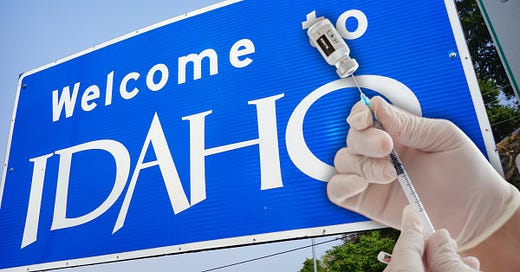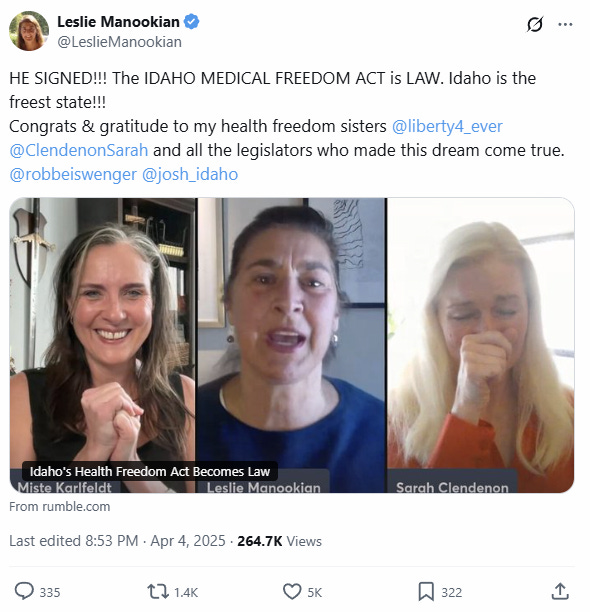This article originally appeared on The Defender and was republished with permission.
Guest post by Brenda Baletti, Ph.D.
The Idaho Medical Freedom Act prohibits most medical mandates, including vaccines, in the state. Under the new law, schools cannot exclude unvaccinated children during an outbreak of a contagious disease they are not vaccinated against.
Idaho Gov. Brad Little on Friday signed into law the Idaho Medical Freedom Act, which prohibits most medical mandates in the state.
The bill prevents businesses and Idaho local, county and state governments from requiring medical interventions for employment, admission to venues, transportation, or for providing products or services, with some exceptions.
Little signed the law almost a week after he vetoed a previous version of the bill, citing concerns it would have prohibited schools from sending home “sick students with highly contagious conditions.”
The new version of the bill clarifies that schools and businesses can turn away students, employees or customers who are sick, but they cannot require a medical intervention, including a vaccine.
The new version also specified that schools cannot exclude unvaccinated children during an outbreak of a contagious disease they are not vaccinated against.
The revised bill was first introduced in the House, where it passed 44-23. The Senate also voted to pass it, with no debate, 27-6. Little signed it immediately.
The bill’s author, Leslie Manookian, president and founder of the Health Freedom Defense Fund, celebrated the new law on X, where she posted a video of her and co-organizers Miste Karlfeldt and Sarah Clendenon discussing the victory for the medical freedom movement there.
Karlfeldt told The Defender that Idahoans rallied in response to rights violations that became especially apparent during “the COVID debacle.”
The governor also previously signed a bill that bans government and school mask mandates, she said, and another law, Senate Bill (SB) No. 1031, that limits the power of public health districts to do only what is “necessary and reasonable” to protect public health.
“We have set the bar and now other states in the nation are modeling bills after Idaho’s Medical Freedom Act,” Karlfeldt said. “Louisiana has one right now it’s hoping will pass because Idaho was brave enough to pass this monumental legislation. We hope to see all states secure their medical freedom rights as we have in the great state of Idaho.”
Sayer Ji of GreenMedInfo and the Global Wellness Forum celebrated the news as a “historical and revolutionary affirmation of the inalienable right to bodily autonomy.”
He said:
“In an era when coercive medical mandates have deeply eroded public trust and violated constitutional protections, this bill reasserts a foundational truth: that every individual has the sovereign right to make personal health decisions without fear of discrimination, punishment, or exclusion.
“By codifying health freedom into state law, Idaho is doing more than protecting its citizens — it is lighting the way for a nationwide return to constitutional governance, medical ethics and human dignity. This is not merely legislation. It is a landmark declaration of principles that can — and must — resonate far beyond state borders.”
Debating the day care carveout
After Little vetoed the first version of the bill (SB 1023), the Senate State Affairs Committee introduced a new version, SB 1210, which would have exempted day cares from the new law, allowing them to mandate vaccinations for workers and children and toddlers.
Manookian said people who were working with legislators on the issue were surprised by the amended Senate bill that excluded day cares, especially because Little’s objection to the original bill was unrelated to day cares.
She suspected it may be tied to a case before the Idaho Supreme Court.
Ashley Tipton in 2022 sued New Horizon Academy, a day care in Boise, after it rejected her daughter as a client because she was not vaccinated. A district judge in 2023 dismissed the case, but Tipton appealed to the Idaho Supreme Court. Oral arguments in the case are scheduled for May 5.
New Horizon operates day cares in numerous states, including Minnesota, Colorado, and Idaho.
While the Senate was advancing SB 1210, the House State Affairs Committee advanced a competing bill, House Bill 472, that was similar to the original bill but specified that it did not supersede rights granted to schools by existing codes. That clause was meant to address specifically the governor’s stated concerns about the original bill, Manookian said.
That version of the bill eventually passed both houses and was signed by Little but did not include the day care carve-out.
Legislators debating on the Senate floor said the bill allows parents to opt out of vaccination for day cares or for school. However, the Idaho Statesman reported that a spokesperson from Little’s office said Friday that day cares would still be able to require vaccination under the new law.
Manookian said she thought this was an attempt by those working against the legislation to “spin the story in their favor,” but that under the new law, day cares would not be able to require vaccines.
This is a step toward a broader goal, Manookian said. “We want to establish a new societal norm that we alone get to make our own medical decisions without fear of being excluded from normal life. Engagement in everyday life shouldn’t be conditioned upon receiving a medical intervention.”
“We want all Americans to be able to live free in the way that Idahoans can now.”
Donate to Children’s Health Defense





